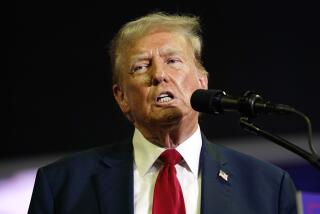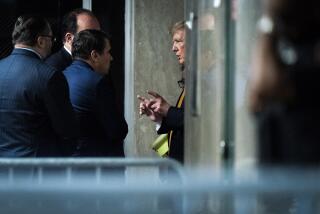Jurors Watch Reagan’s Videotaped Testimony : Iran-Contra: President cites a poor memory. The judge at Poindexter’s trial upholds executive privilege claim in denying a defense request for diaries.
WASHINGTON — The voice of Ronald Reagan filled a federal courtroom for five hours Wednesday as jurors watched the former President discuss his recollections of the Iran-Contra affair in videotaped testimony at the trial of John M. Poindexter.
The jury, which appeared mostly attentive during the often tedious testimony shown on four television sets, heard Reagan cite a poor memory as the answer to dozens of questions about the Iran-Contra case.
As the day began, U.S. District Judge Harold H. Greene denied a request for access to Reagan’s personal notes and diaries, which defense lawyers had sought to clear up facts that Reagan could not recall.
Upholding Reagan’s claim of “executive privilege” over the diaries, Greene said the poor memory of a witness “does not automatically entitle a party . . . to rummage through (his) personal papers,” particularly those of a President.
The ruling represented a reversal by Greene, who earlier this year had ruled that Reagan should turn over his diaries. But after Reagan claimed executive privilege, Greene reconsidered. Wednesday he said he had decided that the diaries were not significant enough to be “essential to the achievement of justice” for Poindexter, who was national security adviser under Reagan.
The judge, who has examined excerpts from the diaries in private, said the notes “are brief and even cursory; the longest consists of five sentences.
“The topics about which he (Reagan) recalled the least are also the ones about which he wrote nothing or virtually nothing,” Greene said.
He added that Reagan “did testify under oath at great length about many specific activities in his Administration--an event that is unprecedented in American history.”
Although other past presidents, including Richard M. Nixon, Gerald R. Ford and Jimmy Carter, have given court testimony, their accounts were sharply limited in scope.
In Reagan’s videotaped testimony, which was released in transcript form to the press last month, he insisted he did not authorize the $14-million diversion of funds from Iranian arms sales to the Nicaraguan resistance and did not authorize Poindexter or anyone else to violate any laws.
Poindexter is being tried on five charges of conspiracy, obstruction of congressional inquiries and making false statements to Congress.
Reagan repeatedly underlined his confidence in his embattled former aide and made clear that Poindexter’s efforts to support the Contras in the face of congressional opposition were, in effect, an extension of Reagan’s strongly held principles.
Reagan referred to the Boland Amendment, a congressional prohibition on U.S. aid to the Contras, as “a disaster.” He was asked whether he and Poindexter ever had discussed ways to obtain more congressional aid.
“I can’t think of anything more than just to carry the battle to them (members of Congress),” Reagan replied.
Time and again, Reagan said on the videotape that he could not recall details of specific meetings with Poindexter and other top aides, once asserting that he held an average of 80 conversations a day.
The jury spent all day Wednesday watching much of Reagan’s eight hours of videotaped testimony and is expected to complete the task this morning. The sessions were taped Feb. 16 and 17 in a sealed courtroom in Los Angeles.
Although transcripts had been given to reporters last month, and reporters had been allowed to watch the tape, actual copies of the videotape were provided Wednesday for the first time to the television networks.
The former President appeared relaxed and in good humor during most of his session, although he frowned frequently when asked about events he could not recall. Jurors smiled at one point when Reagan mistakenly referred to France as having been involved in the Iran-Contra affair, then corrected himself good-naturedly.
More to Read
Sign up for Essential California
The most important California stories and recommendations in your inbox every morning.
You may occasionally receive promotional content from the Los Angeles Times.









